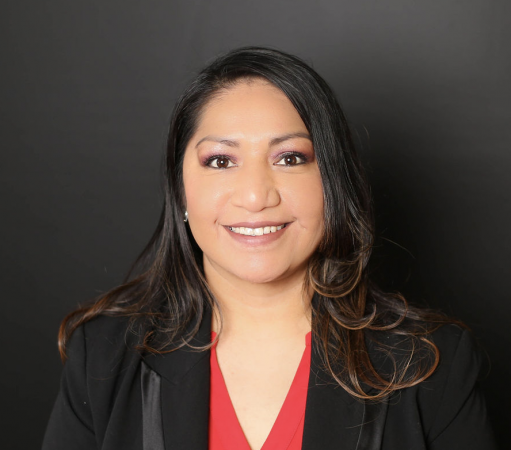
- Details
- By Joe Boomgaard
PEACH SPRINGS, Ariz. — Starting with Grand Canyon Resort Corporation 20 years ago as a concierge, Ruby Steele has now worked her way to the very top of the organization.
 Ruby Steele. Photo: SC PHOTO.Last week, the board of directors for the company, an enterprise of the Hualapai Tribe, selected Steele to serve as interim CEO of GCRC, which operates a range of businesses in northwestern Arizona, including the iconic Grand Canyon Skywalk.
Ruby Steele. Photo: SC PHOTO.Last week, the board of directors for the company, an enterprise of the Hualapai Tribe, selected Steele to serve as interim CEO of GCRC, which operates a range of businesses in northwestern Arizona, including the iconic Grand Canyon Skywalk.
“I can honestly say that I worked my way from the ground up,” Steele said, who over her career worked in various departments and management throughout the organization, including most recently as chairwoman of the board of directors.
After years of working with non-tribal executives, the board specifically picked a tribal member to lead the firm through the recovery and reinvention process as it grapples with fallout from the COVID-19 pandemic, which has devastated the tourism and hospitality industry.
Ensuring the company’s long-term viability is doubly important for the Hualapai tribal enterprise, which was created to offer economic and employment opportunities for tribal members. A majority of the company’s employees — 56 percent — are Native American.
Without a casino on the Hualapai reservation, the tribe relies heavily on GCRC as the centerpiece of its economy, which also benefits from cattle ranching and arts and crafts.
Despite the challenging business conditions, Steele said her goal is to position GCRC so that “the next CEO should be able to step in and pick up the reins to continue to lead us into the future.”
Steele spoke with Native News Online about the importance of focusing on workplace culture and remaining flexible as a business, as well as the unique balance that Native-owned companies must strike. (This interview has been condensed for length and clarity.)
How has Grand Canyon Resort Corporation managed through the last few months?
Obviously, there’s been a decline in visitation. This busy period during our summer season was not as we have seen historically. So we’ve definitely had to revamp and reorganize our destination … [and] the organization as a whole. We know visitation is down. We know that our revenue is not going to be what it was in historical times.
What has been key to the company’s survival?
We believe that we can operate our business better by making smarter decisions and more efficient decisions moving forward. It’s my belief that companies that rise to the challenge and evolve to develop new ways to adopt the new normal will survive. … The Grand Canyon Resort Corporation has been through many bumps along the way, and this pandemic is just one more hurdle for us to cross. It is my belief that together we will emerge stronger than ever.
You’re taking over the company during a tumultuous time for the tourism and hospitality industry. What are your goals throughout this transition period?
Revamping our workplace culture — that is our top priority. We need to boost employee performance and motivate our team to succeed. Our company’s culture and our core values are what embody this. We must actively define and live every single day through our actions and behaviors for our entire organization. We can do this by making our culture visible, get everyone aligned, respect our past, create strategy, communicate openly and let collaboration define our results. Not one person in our organization is more important than the other. We need each other to help drive the mission and vision of our organization.
How do you look to put your fingerprints on the reinvention of the organization?
Our top business goal is to develop revenue and build visitation for GCRC. Obviously, those are two goals that are most difficult during this time. But that’s also very important to me as a tribal member because the revenue generated from our business is filtered to many of our tribal departments, which eventually aids our people. It is not that we’re selling tickets to a destination, we’re creating a cultural experience as our destinations tell our story as a people.
By improving employee relations with all of our employees, both tribal and non-tribal, and creating more opportunities for tribal members through employment, that is a critical component of reinventing the company. With my knowledge of the internal structure of the corporation and the tribal entities, it is my hope to help make that transition as seamless as possible.
What has the falloff in visits and revenues taught the leadership at GCRC?
We do realize that we need to execute a revamped marketing campaign, showcasing our core products with special emphasis on what is most important for our consumers who want to travel or have a summer vacation. How do we provide that safe experience for them? One of the things that we also realized was we need to start thinking outside the box and looking for new opportunities to diversify the company. Although I can’t go into details at this time, what I can say is yes, our organization and tribe are looking at other ways to ensure that we have long-term sustainability for the benefit of our people.
What do you hope the organization looks like by the time it ultimately selects a permanent CEO?
There are so many unknowns in this situation and it really depends on when this pandemic ends and what it looks like. But my goal as interim CEO is to continue to follow the science and safety guidelines and procedures so that we can operate effectively while keeping our employees, guests, and community as safe and secure as possible. It is also my hope that through the reinvention of the company [and] creating a blueprint, the next CEO should be able to step in and pick up the reins to continue to lead us into the future.
During the pandemic, how do tribally owned companies think differently compared to private enterprises?
As Native people, our foremost concern is that we protect our people at all costs. Our communities are different in that we have multi-generational homes, so we have to use extra safety precautions while we’re out in the public because we don’t want to bring the illness home to our elders, to our parents and to our children. When we think of organizations and we think of Fortune 500 companies all over the world, we’re different in those terms because we have communities to protect.
What does that mean in terms of corporate decision making?
It may not be that our decisions are based on the bottom-line revenue. Our decisions also are made by the possibility of bringing the sickness home to our communities. I’ve talked to Native leaders all across the states, and that’s ultimately their number one goal: to protect the safety and health of the people.
More Stories Like This
American Basketball Association Announces Native ABA InitiativeFour Winds South Bend Upgrades to Class III Gaming Casino
Native News Online Wins Two Awards from Native American Journalists Association
Wahlberg Brothers Are a Big Hit at Indian Gaming Tradeshow and Convention in Las Vegas
Native Gro Offers Tribes a ‘One-Stop Shop’ for Entering the Cannabis Industry
Help us defend tribal sovereignty.
At Native News Online, our mission is rooted in telling the stories that strengthen sovereignty and uplift Indigenous voices — not just at year’s end, but every single day.
Because of your generosity last year, we were able to keep our reporters on the ground in tribal communities, at national gatherings and in the halls of Congress — covering the issues that matter most to Indian Country: sovereignty, culture, education, health and economic opportunity.
That support sustained us through a tough year in 2025. Now, as we look to the year ahead, we need your help right now to ensure warrior journalism remains strong — reporting that defends tribal sovereignty, amplifies Native truth, and holds power accountable.
 The stakes couldn't be higher. Your support keeps Native voices heard, Native stories told and Native sovereignty defended.
The stakes couldn't be higher. Your support keeps Native voices heard, Native stories told and Native sovereignty defended.
Stand with Warrior Journalism today.
Levi Rickert (Potawatomi), Editor & Publisher

